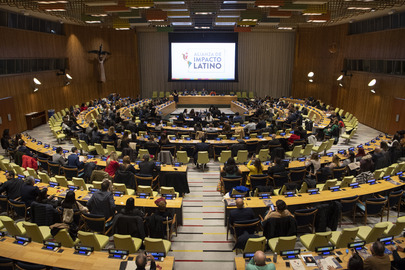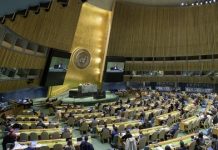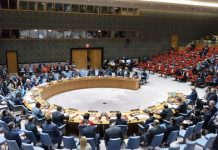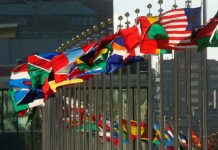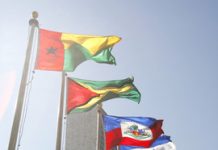Aid coordination office OCHA said the UN and our partners are dispatching supplies to designated emergency shelters and distribution centres across the Strip.
“We are distributing food parcels and flour and working to re-open bakeries,” said UN Deputy Spokesperson Farhan Haq.
More than 50,000 food parcels
On Monday and Tuesday, colleagues from the UN Palestine refugee agency, UNRWA, distributed 118 trucks of more than 53,000 food parcels to communities in Khan Younis and to its shelters in Deir Al-Balah.
Reproductive health agency UNFPA said 20 trucks carrying critical supplies, including for safe births, emergency obstetric care, postpartum kits, contraceptives and winter items, were offloaded in Deir Al-Balah on Tuesday.
Twenty more trucks carrying UNFPA assistance are entering northern Gaza on Wednesday.
The UN Office for Project Services (UNOPS) is distributing fuel to ensure critical services such as healthcare and water pumping and desalination can run on back-up generators in the absence of electricity.
The UN and its partners are also supporting infrastructure repairs, including to water wells and desalination plants.
“Our humanitarian partners are carrying out rapid assessments in newly accessible areas to identify people’s most urgent needs, including water, hygiene, sanitation and healthcare,” Mr. Haq added.
They are also stepping up disease surveillance efforts, setting up trauma stabilisation points for emergency care and mobilising specialised health teams.
Sudan: Civilians in peril ahead of ‘likely imminent attack’ by RSF militia
The UN rights office, OHCHR, expressed deep concern on Wednesday over a likely offensive against the Darfuri city of El Fasher, in Sudan, which has been besieged for months by the so-called Rapid Support Forces (RSF) which are battling government troops for control of the country.
OHCHR spokesperson Seif Magango said the RSF had issued a statement on Monday with an ultimatum to the national army and affiliates to leave the city by Wednesday afternoon. Government forces were defiant in face of the order.
“We renew our call on both parties to de-escalate tensions around the city and to take urgent steps to ensure its civilian population is protected, consistent with their obligations under international law,” said Mr. Magango.
“The people of El Fasher have suffered so much already from many months of senseless violence and brutal violations and abuses, particularly in the course of the prolonged siege of their city. This must stop.”
Drone attacks
Aid coordination office OCHA also voiced deep concern on Wednesday over a series of reported drone attacks on civilians and critical civilian infrastructure in the northern, eastern and central areas of Sudan.
An attack Wednesday reportedly targeted the um Dabakir power station around Kosti, south of the capital, Khartoum. This follows another reported strike on a power station in Northern state earlier this week.
OCHA said that major cuts to water and power risk depriving people of access to critical health services and safe water supplies.
Parties to the fighting, under international law, have a clear obligation not to attack objects indispensable to the survival of the civilian population.
Somalia: Aid partners seek $1.42 billion to help 4.6 million people
A joint appeal was launched on Wednesday for $1.4 billion by the UN, aid partners and the country’s authorities to help millions who need lifesaving humanitarian support and protection.
“Recurrent shocks, food insecurity and malnutrition remain widespread across Somalia,” warned George Conway, the top UN aid official there.
In a statement in support of the aid appeal to help 4.6 million people of the nearly six million in need, Mr. Conway said that this year’s humanitarian needs and response plan will provide lifesaving assistance, particularly to vulnerable groups such as women, children and the elderly.
The UN official explained that the situation in Somalia improved slightly in 2024 compared to previous years when “widespread conflict, devastating droughts and flooding” were the norm.
The improvements last year were the result of investments in early warning systems, community preparedness and improved cooperation between humanitarians and the authorities, Mr. Conway explained.
UN rights experts alarmed by Belarus trials in absentia
A group of independent UN human rights experts on Wednesday raised the alarm over Belarus’s increasing use of in absentia trials, which lack basic fair trial guarantees.
These trials can lead to severe penalties, including lengthy prison sentences, property confiscation and even the death penalty.
“We have received numerous reports of individuals prosecuted in absentia in Belarus who learn of their prosecution by chance, are unaware of the charges and grounds for their conviction and are completely deprived of a legal defence,” the Human Rights Council-appointed experts stated.
They highlighted that some individuals have unsuccessfully tried to participate remotely or obtain copies of the verdicts.
Belarusian legislation on in absentia trials disregards fair trial guarantees provided by the International Covenant on Civil and Political Rights, which Belarus has ratified. The experts urged the authorities to honour their international obligations.
Civil society reports indicate a dramatic rise in such trials against Belarusians abroad, with 110 cases in 2024 compared to 18 in 2023.
Punishment for dissent
Since the disputed 2020 presidential elections, many Belarusians have fled due to government repression.
“Nevertheless, the Belarusian authorities continue to target these individuals, even in exile,” the experts noted, referencing a 2023 decree that restricts access to identity and travel documents for Belarusians abroad.
Over 100 people, including political opposition members, civil society activists and human rights defenders, have been convicted in absentia since 2022.
Those prosecuted are not notified of proceedings, cannot choose their defence lawyers and cannot participate remotely. Judgements are not public and only brief verdict information is accessible online.
“Convictions in absentia inevitably lead to violations of various human rights,” the experts warned, citing rights to fair trials, freedom of expression and adequate living standards. Sentences include long prison terms, heavy fines and potentially the death penalty.
Special Rapporteurs and other independent rights experts are not UN staff, receive no salary and are independent of any government or organization.
Source of original article: United Nations (news.un.org). Photo credit: UN. The content of this article does not necessarily reflect the views or opinion of Global Diaspora News (www.globaldiasporanews.com).
To submit your press release: (https://www.globaldiasporanews.com/pr).
To advertise on Global Diaspora News: (www.globaldiasporanews.com/ads).
Sign up to Global Diaspora News newsletter (https://www.globaldiasporanews.com/newsletter/) to start receiving updates and opportunities directly in your email inbox for free.


